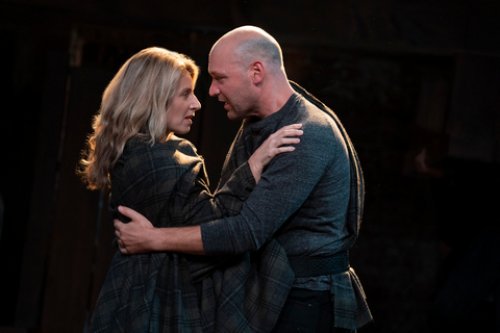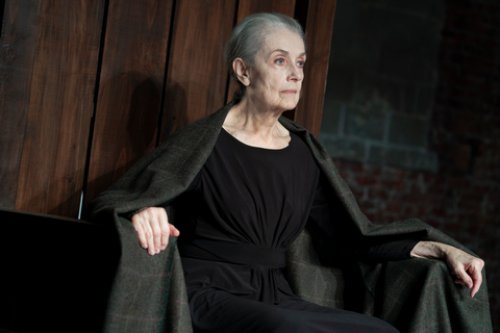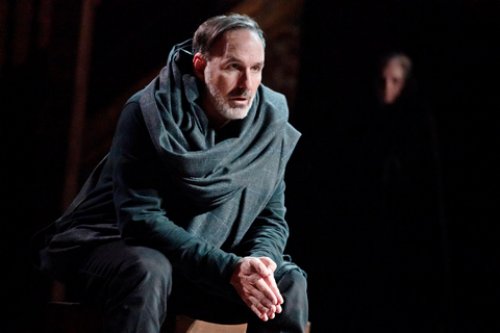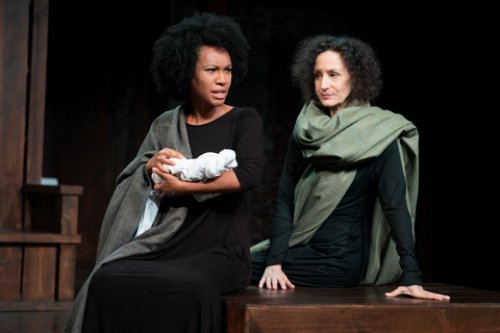Macbeth (Classic Stage Company)
John Doyle’s minimalist production reduces the cast to nine, cuts characters and scenes, and uses little or no design elements.

Nadia Bowers as Lady Macbeth and Corey Stoll in the title role of the Classic Stage Company’s production of Shakespeare’s “Macbeth” (Photo credit: Joan Marcus)
[avatar user=”Victor Gluck” size=”96″ align=”left”] Victor Gluck, Editor-in-Chief[/avatar]
Artistic director John Doyle of the Classic Stage Company has now applied his well-known minimalistic method to Shakespeare’s Scottish tragedy after having applied it to Peer Gynt, As You Like It, Carmen Jones, The Resistible Rise of Arturo Ui and The Cradle Will Rock, among others. In his Macbeth all the parts are played by nine actors which results in the cutting of countless characters including the iconic Porter, as well as the reassignment of lines. Women play men but dressed as women. The three witches in the opening scene are played by all of the actors except for Macbeth and his wife, warning us that we are in for a reconceived version of the play. Scenes are allowed to overlap, while in some sequences, actors have to double in two roles to fill out the tableaux. The only set pieces are a wooden throne chair and two benches which are used occasionally.
There has been a recent trend to perform Shakespeare as minimally as possible and with as few actors as possible. However, the question arises what is gained? When the doubling of roles proves confusing so that when actors appear it is difficult to know who they are playing, what is the point? Here the two actors who play the murderers Macbeth hires to kill Banquo report to him and then take their seats with the guests at his banquet which is quite disconcerting. In Doyle’s version, Macbeth himself kills Lady Macduff and her children rather than his henchmen – so who is minding the palace? Antonio Michael Woodard, the young man who plays Banquo’s son Fleance, appears in this scene as Macduff’s son but we know we have seen him before.

Mary Beth Peil as King Duncan in a scene from the Classic Stage Company’s production of Shakespeare’s “Macbeth” (Photo credit: Joan Marcus)
Also we know that Shakespeare did not write a great many roles for women as theater companies in his days had no more than three boy actors taking these roles. But to have King Duncan played by a woman who is then referred to as The King and he seems pointless. Why not call her the Queen? (For half of his career, Shakespeare wrote during the reign of Queen Elizabeth though this play was written to flatter King James I who was born in Scotland.)
Visually, the play like Doyle’s productions of Resistible Rise of Arturo Ui and The Cradle Will Rock is devoid of atmosphere. Designed by Doyle, the play is performed on a raised wooden rectangular platform around which the audience sits on three sides. The use of the balcony at the far end of the playing works for some scenes, is awkward for others. The costumes designed by Ann Hould-Ward, mostly in shades of grey or other drab colors, with dark Scottish tartans, over the actors’ shoulders also create no atmosphere. There are ways of lighting such a stage so as to paint with light but this Solomon Weisbard does not do. The performance plays like a rehearsal as in in rehearsal clothes – it follows well but there is little or no tension or rising of the temperature.

Erik Lochtefeld as Banquo in a scene from the Classic Stage Company’s production of Shakespeare’s “Macbeth” (Photo credit: Joan Marcus)
In addition, the fact the play appears to have no interpretation also undermines the performances which are not grounded in any idea. Corey Stoll, who has recently played in Troilus and Cressida (Ulysses), Othello (Iago) and Julius Caesar (Brutus) for the New York Shakespeare Festival, is a very introspective Macbeth but this may be the result of the cutting so that his soliloquies come one on top of the other. As his wife, Nadia Bowers (most recently seen in Aaron Posner’s Life Sucks, the Chekhov adaptation) is an aggressive, vigorous Lady Macbeth, the ambitious power behind her husband, but as some of her scenes have been edited, we don’t get as full a profile of her as usual.
The distinguished actress and singer Mary Beth Peil is a level-headed King Duncan but is a bit too sober. Erik Lochtefeld is amusing as Banquo though in other roles is often confused with Barzin Akhavan’s Macduff as their beards make them look so alike. Barbara Walsh as the Thane of Ross is serviceable but seems to have wandered in from another play. On the other hand, N’Jameh Camara is a passionate Lady Macduff stealing the other actors’ thunder.

N’Jameh Camara as Lady Macduff and Barbara Walsh as Ross in a scene from the Classic Stage Company’s production of Shakespeare’s “Macbeth” (Photo credit: Joan Marcus)
John Doyle’s Macbeth is an interesting but not very successful minimalist version of a Jacobean tragedy. While individual performances are interesting, without an overriding interpretation, they are left out on their own. The one thing that the production must be commended for is the clarity of the diction. With no set and limited costuming, it is almost like watching a staged reading which this does not purport to be.
Macbeth (through December 15, 2019)
Classic Stage Company,
Lynn F. Angelson Theater, 136 E. 13th Street, in Manhattan
For tickets, call 212-352-3101 or visit http://www.classicstage.org
Running time: one hour and 45 minutes with no intermission






Whats up very cool website!! Man .. Beautiful .. Superb ..
I’ll bookmark your site and take the feeds also?
I’m satisfied to find numerous helpful information here within the publish,
we want develop extra strategies in this regard, thanks for sharing.
. . . . .